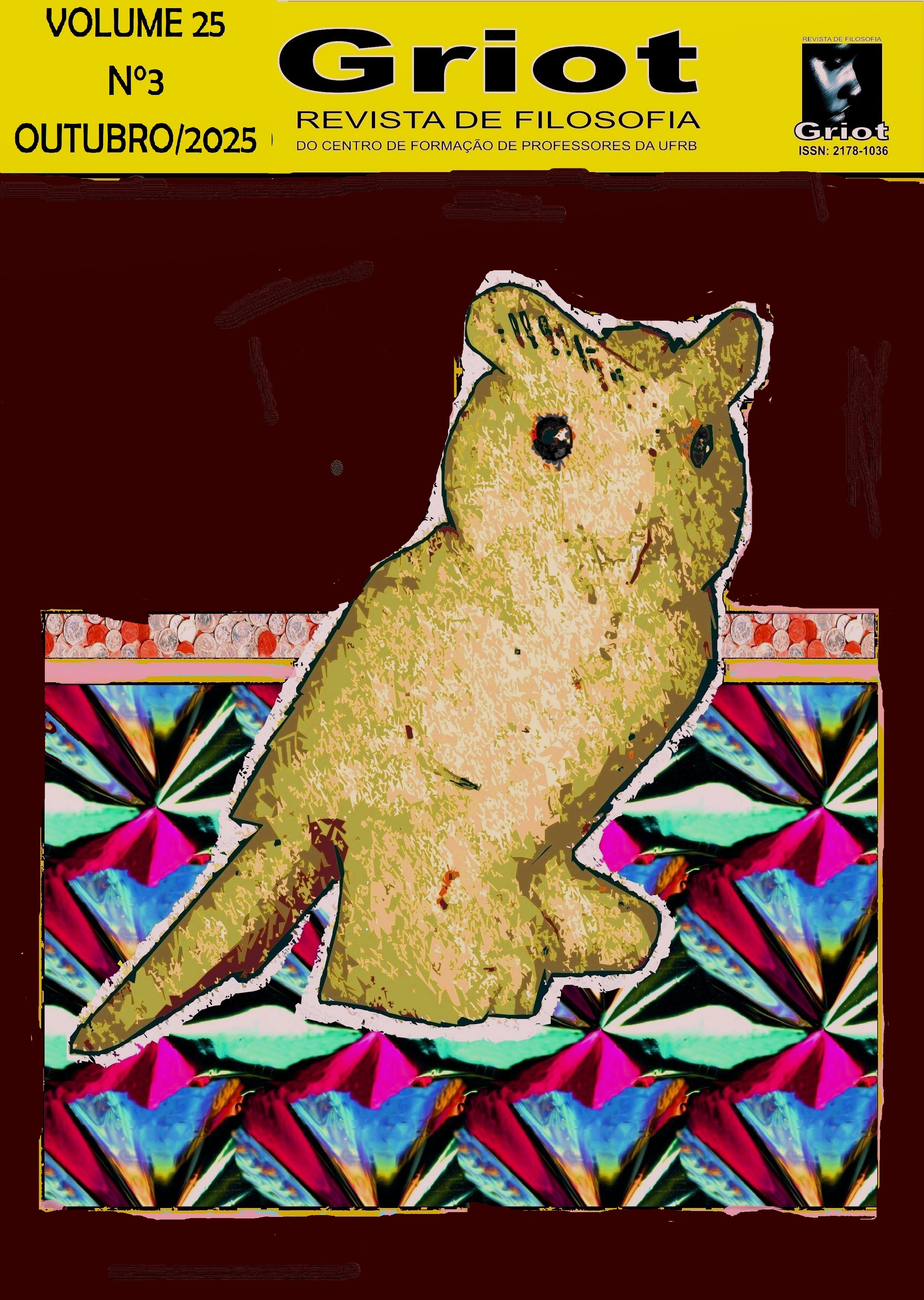Freud’s concept of the unconscious: a philosophical ontology of human existence
DOI:
https://doi.org/10.31977/grirfi.v25i3.5395Palavras-chave:
Freud; psychoanalysis; unconscious; ontology; human existence; philosophical anthropology.Resumo
This article explores the ontological dimension of Sigmund Freud’s psychoanalytic theory, focusing particularly on the concept of the unconscious and its foundational role in shaping human existence. While Freud did not claim to be a philosopher, his analysis of the human psyche led him to confront core philosophical questions regarding the nature of being. The study traces how Freud’s clinical method—originally developed to treat mental illness—evolved into a broader inquiry into the structure of the human personality through key concepts such as the Id, Ego, and Superego. By positioning the unconscious not merely as a psychological phenomenon but as a central element in the ontological structure of the human being, Freud inadvertently contributed to reconfiguring the philosophical understanding of the self. Drawing comparisons with classical and modern Western philosophical thought, the article demonstrates that Freud’s theory bridges psychology and philosophy, revealing human beings as complex, internally conflicted entities shaped by both instinctual drives and sociocultural norms. In doing so, Freud laid the groundwork for a philosophical anthropology in which the human subject is no longer understood solely through consciousness and reason, but as a dynamic intersection of unconscious forces and cultural formations.
Downloads
Referências
COSTA, V. H. F. d. Uma leitura sobre a aporia de “dialética do esclarecimento” a partir de Freud, Marx e Weber. Griot: Revista de Filosofia, 13, n. 1, p. 391-410, 2016. https://doi.org/10.31977/grirfi.v13i1.678.
CSÁNYI, G. The Bourdieusian Unconscious: The Scientific and Political Significance of the Sociological Treatment of a Psychoanalytic Concept. Journal for the Theory of Social Behaviour, 55, n. 1, p. e12437, 2025. https://doi.org/10.1111/jtsb.12437.
DANG, H. T. Freudian Anthropology. Philosophy Review, n. 11, p. 22-33, 2012.
DIEP, M. L. Sigmund Freud. Hue: Thuan Hoa Publishing House, 2002.
DO, M. H. Freudian philosophical anthropology and its influence on modern Western philosophical anthropology. Hanoi: Religion Publishing House, 2014.
FERNANDEZ DE SOUZA, P. Freud e a ética do fragmento. Griot: Revista de Filosofia, 23, n. 3, p. 131-146, 2023. https://doi.org/10.31977/grirfi.v23i3.3443.
FREUD, S. Psychoanalytic Studies. Tradução VU, D. L. Saigon: An Tiem Publishing House, 1969.
FREUD, S. Introduction to Psychoanalysis. Tradução NGUYEN, X. H. Hanoi: Hanoi National University Press, 2002.
FREUD, S. Crowd psychology and analysis of the human ego. Tradução PHAM, N. T. Hanoi: Tri Thuc Publishing House, 2009.
GU, M. D. Cultural Unconscious: A Theory of Cultural Criticism. European Review, 32, n. 1, p. 44-65, 2024. https://doi.org/10.1017/S1062798723000339.
KHUAT, T. N. Human Existence Through Philosophical Inquiry and Technological Transformation: An Analytical Study. Kalagatos, 21, n. 2, p. eK24054, 2024.
KNAFO, G.; WEINBERGER, J. Exploring the Role of Conscious and Unconscious Processes in Hypnosis: A Theoretical Review. Brain Sciences, 14, n. 4, 2024. https://doi.org/10.3390/brainsci14040374.
NGUYEN, H. H. Some modern Western philosophical trends. Hanoi: Culture and Information Publishing House, 2001.
NGUYEN, P. T.; NGUYEN, Q. T. The philosophy of human emancipation in Ho Chi Minh’s ideas and its contemporary relevance in Vietnam. Kalagatos, 21, n. 1, p. eK24009, 2024.
O’LOUGHLIN, M. Academic freedom: Challenges to cultivating a revolutionary unconscious in a neoliberal world. Psychoanalysis, Culture & Society, 30, n. 1, p. 7-24, 2025. https://doi.org/10.1057/s41282-024-00517-6.
PHAM, M. L. Freud and Psychoanalysis. Hanoi: Culture and Information Publishing House, 2000.
SILVA, R. O. Princípio de prazer e efeito subjetivo da lei moral em Kant e Freud. Griot: Revista de Filosofia, 19, n. 2, p. 108-121, 2019. https://doi.org/10.31977/grirfi.v19i2.1166.
THOMPSON, M. J. Freud, Marx, and the Structure of Freedom. In: BYRD, D. J. e MIRI, S. J. (Ed.). Sigmund Freud as a Critical Social Theorist: Psychoanalysis and the Neurotic in Contemporary Society, 2025. p. 208–239.https://doi.org/10.1163/9789004713789_010.
WARMLING, D. L.; BASTONE, P. Freud e o descentramento da subjetividade: o inconsciente como via de recusa consciencialista. Griot: Revista de Filosofia, 23, n. 2, p. 79-98, 2023. https://doi.org/10.31977/grirfi.v23i2.3270.
ZHANG, L.; YUAN, X.; CUI, H. A new perspective on the relationship between body and mind in the unconscious: The comparison between Freud and Merleau-Ponty. Frontiers in Psychology, 14, p. 1073362, 2023. https://doi.org/10.3389/fpsyg.2023.1073362.
Downloads
Publicado
Como Citar
Edição
Seção
Licença
Copyright (c) 2025 Ha Van Thi Ta

Este trabalho está licenciado sob uma licença Creative Commons Attribution 4.0 International License.
Os autores que publicam na Griot : Revista de Filosofia mantém os direitos autorais e concedem à revista o direito de primeira publicação, com o trabalho simultaneamente licenciado sob a Creative Commons Attribution 4.0 International License, permitindo compartilhamento e adaptação, mesmo para fins comerciais, com o devido reconhecimento da autoria e publicação inicial nesta revista. Leia mais...









































































